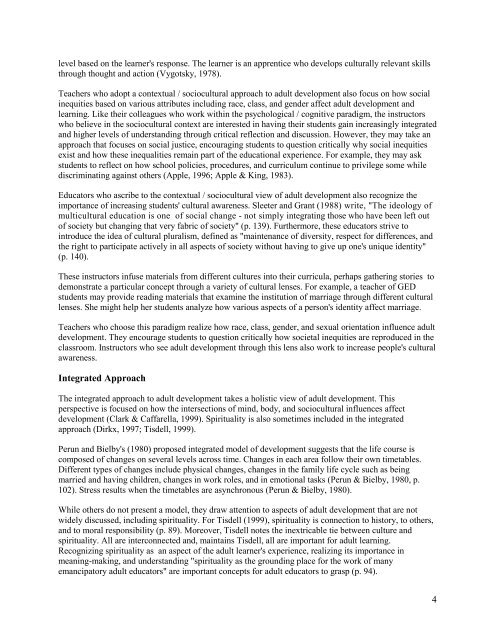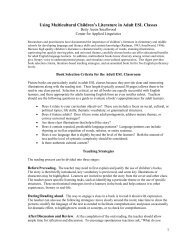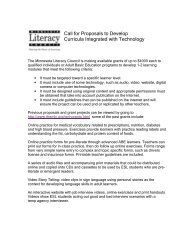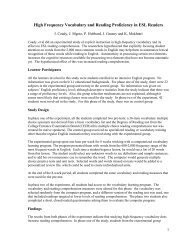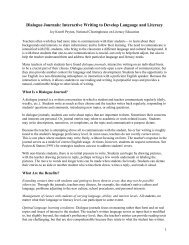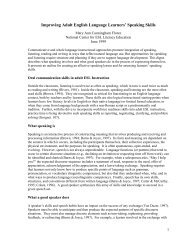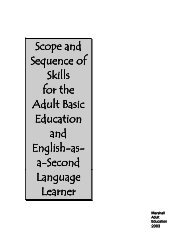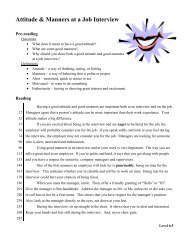Four Adult Development Theories and Their Implications for Practice
Four Adult Development Theories and Their Implications for Practice
Four Adult Development Theories and Their Implications for Practice
You also want an ePaper? Increase the reach of your titles
YUMPU automatically turns print PDFs into web optimized ePapers that Google loves.
level based on the learner's response. The learner is an apprentice who develops culturally relevant skills<br />
through thought <strong>and</strong> action (Vygotsky, 1978).<br />
Teachers who adopt a contextual / sociocultural approach to adult development also focus on how social<br />
inequities based on various attributes including race, class, <strong>and</strong> gender affect adult development <strong>and</strong><br />
learning. Like their colleagues who work within the psychological / cognitive paradigm, the instructors<br />
who believe in the sociocultural context are interested in having their students gain increasingly integrated<br />
<strong>and</strong> higher levels of underst<strong>and</strong>ing through critical reflection <strong>and</strong> discussion. However, they may take an<br />
approach that focuses on social justice, encouraging students to question critically why social inequities<br />
exist <strong>and</strong> how these inequalities remain part of the educational experience. For example, they may ask<br />
students to reflect on how school policies, procedures, <strong>and</strong> curriculum continue to privilege some while<br />
discriminating against others (Apple, 1996; Apple & King, 1983).<br />
Educators who ascribe to the contextual / sociocultural view of adult development also recognize the<br />
importance of increasing students' cultural awareness. Sleeter <strong>and</strong> Grant (1988) write, "The ideology of<br />
multicultural education is one of social change - not simply integrating those who have been left out<br />
of society but changing that very fabric of society" (p. 139). Furthermore, these educators strive to<br />
introduce the idea of cultural pluralism, defined as "maintenance of diversity, respect <strong>for</strong> differences, <strong>and</strong><br />
the right to participate actively in all aspects of society without having to give up one's unique identity"<br />
(p. 140).<br />
These instructors infuse materials from different cultures into their curricula, perhaps gathering stories to<br />
demonstrate a particular concept through a variety of cultural lenses. For example, a teacher of GED<br />
students may provide reading materials that examine the institution of marriage through different cultural<br />
lenses. She might help her students analyze how various aspects of a person's identity affect marriage.<br />
Teachers who choose this paradigm realize how race, class, gender, <strong>and</strong> sexual orientation influence adult<br />
development. They encourage students to question critically how societal inequities are reproduced in the<br />
classroom. Instructors who see adult development through this lens also work to increase people's cultural<br />
awareness.<br />
Integrated Approach<br />
The integrated approach to adult development takes a holistic view of adult development. This<br />
perspective is focused on how the intersections of mind, body, <strong>and</strong> sociocultural influences affect<br />
development (Clark & Caffarella, 1999). Spirituality is also sometimes included in the integrated<br />
approach (Dirkx, 1997; Tisdell, 1999).<br />
Perun <strong>and</strong> Bielby's (1980) proposed integrated model of development suggests that the life course is<br />
composed of changes on several levels across time. Changes in each area follow their own timetables.<br />
Different types of changes include physical changes, changes in the family life cycle such as being<br />
married <strong>and</strong> having children, changes in work roles, <strong>and</strong> in emotional tasks (Perun & Bielby, 1980, p.<br />
102). Stress results when the timetables are asynchronous (Perun & Bielby, 1980).<br />
While others do not present a model, they draw attention to aspects of adult development that are not<br />
widely discussed, including spirituality. For Tisdell (1999), spirituality is connection to history, to others,<br />
<strong>and</strong> to moral responsibility (p. 89). Moreover, Tisdell notes the inextricable tie between culture <strong>and</strong><br />
spirituality. All are interconnected <strong>and</strong>, maintains Tisdell, all are important <strong>for</strong> adult learning.<br />
Recognizing spirituality as an aspect of the adult learner's experience, realizing its importance in<br />
meaning-making, <strong>and</strong> underst<strong>and</strong>ing "spirituality as the grounding place <strong>for</strong> the work of many<br />
emancipatory adult educators" are important concepts <strong>for</strong> adult educators to grasp (p. 94).<br />
4


